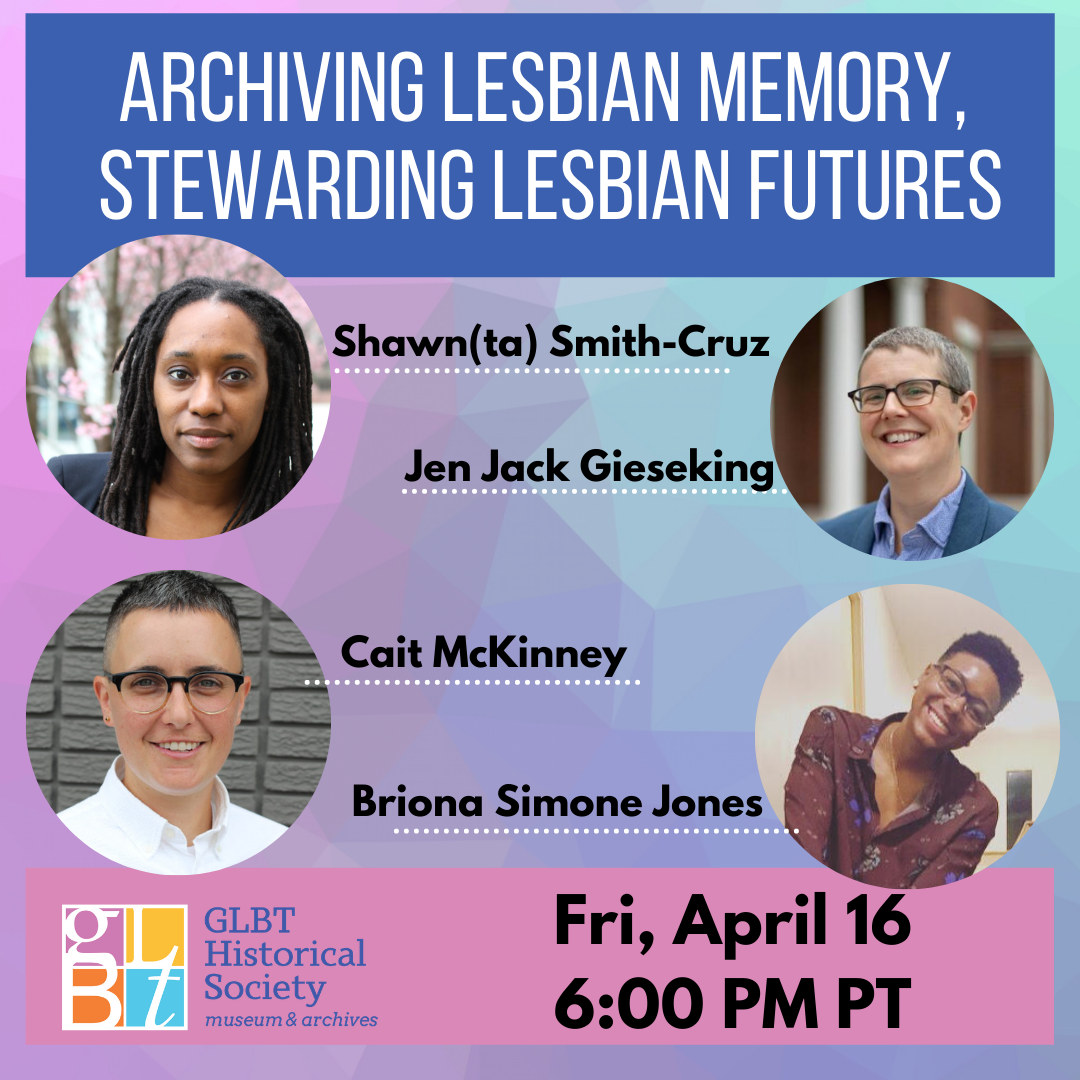Photo of Jen Jack Gieseking courtesy of CC-BY University of Kentucky. Photo of Cait McKinney by Hedia Maron. Photo of Shawnta Smith-Cruz by Erin Burns.
In honor of Lesbian Visibility Day, a panel of scholars in fields ranging from geography and communication to English and archival studies will introduce four different projects that focus on caring for lesbian herstories, ideas and stories. What narratives, forms of community, ideas about space and experiences of sexuality are most visible, and how can practices like archiving, anthologizing, mapping and researching shift these terms? The panelists will draw connections among these projects to think about the stories we can bring to imagining lesbian herstories and futures.
SPEAKERS
Jen Jack Gieseking (he/him) is an urban and digital cultural geographer and environmental psychologist and assistant professor of geography at the University of Kentucky. Jack’s first monograph, A Queer New York: Geographies of Lesbians, Dykes, and Queers, 1983–2008 (NYU Press, 2020), is a historical geography of contemporary lesbian-queer society and economies in New York City. As part of his commitment to public queer history, Jack created a companion website including interactive maps of over 3,000 lesbian and queer places and organizations gathered from archival sources: the An Everyday Queer New York website. He is presently conducting research on trans people’s use of Tumblr as a site of cultural production, and a hub for co-produced health and medical knowledge. Jack is Managing Editor of ACME: International Journal of Critical Geography, the only fully open access journal in geography, as well as a board member of the Rainbow Heritage Network.
Cait McKinney (they/them) is assistant professor of communication at Simon Fraser University, the author of Information Activism: A Queer History of Lesbian Media Technologies (Duke, 2020), and coeditor of Inside Killjoy's Kastle: Dykey Ghosts, Feminist Monsters, and other Lesbian Hauntings (UBC, 2019). McKinney is interested in how queer social movements use digital technologies to build alternative information infrastructures. Their current research is on activist responses to early online content regulations; the intertwined histories of AIDS Activism and digital technologies; and the ways sexuality has been used to explain data and databases since the mid 20th century.
Briona Simone Jones (she/her) is a doctoral candidate in the Department of English at Michigan State University. She is a Black lesbian feminist of Jamaican and African American descent from Rochester, New York. She is the editor of Mouths of Rain: An Anthology of Black Lesbian Thought, published by the New Press, and described as a groundbreaking collection tracing the history of intellectual thought by Black lesbian writers, in the tradition of the New Press’s perennial seller Words of Fire.
Shawn(ta) Smith-Cruz (she/her) is an archivist at the Lesbian Herstory Archives, an assistant curator and associate dean for teaching, learning, and engagement at New York University Division of Libraries. She is a co-chair for the board of CLAGS: The Center for LGBTQ Studies at the Graduate Center, CUNY and chair of the archives committee. She is the 2020 recipient of the WGSS Award for Significant Achievement, sponsored by Duke University Press, administered by the Association of College and Research Libraries (ACRL), a division of the American Libraries Association, for her work archiving and exhibiting the Salsa Soul Sisters, the first lesbian of color organization in the country.
HOW TO PARTICIPATE
This event will take place online. After you register, you will receive a confirmation email with a link and instructions on how to join.
ADMISSION
Free | $5 suggested donation
Register online here: http://bit.ly/3dI7IMP
ASL INTERPRETATION
ASL interpretation provided upon request. Please write at least three days in advance of event to leigh@glbthistory.org.
JOIN THE GLBT HISTORICAL SOCIETY
Become a member of the GLBT Historical Society for free museum and program admission, discounts in the museum shop and other perks: www.glbthistory.org/memberships.

